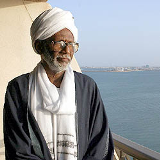Sudan cracks down on opposition in overnight raids
KHARTOUM, Sept 8 (AFP) — Sudan’s security forces have arrested more than a dozen Islamist militants from the party of detained opposition leader Hassan Turabi, accusing them of subversion and arms trafficking with an unnamed neighbouring country.
 In overnight raids, agents seized Popular Congress party officials to crack down on the Khartoum government’s rivals, party sources said Wednesday.
In overnight raids, agents seized Popular Congress party officials to crack down on the Khartoum government’s rivals, party sources said Wednesday.
Official Omdurman radio broadcast a statement from the Sudanese intelligence services saying those arrested were accused of “subversion” and of buying arms from a neighbouring country, which was not identified.
Sudan has bad relations with neighbouring Eritrea, which it has several times accused of plotting with the Sudanese opposition.
Mohammed Hassan Amin, a member of the party’s general secretariat, told AFP that 14 party members were detained overnight, including three of the national leadership.
He named these as Adam Tahar Hamdun, a former commerce minister; Mohammed Abdel Maaruf, former deputy defence minister and Ibrahim Abdel Hafiz, a former deputy governor.
Most of the 14 seized had been among 49 detainees who had been released only in late July, said Amin, adding that the movement “neither possessed any weapons nor called for violence”.
According to witnesses, police, soldiers and security forces took positions at numerous checkpoints at crossroads and traffic lights, stopped and closely searched every passing vehicle.
A one-time mentor of President Omar al-Beshir, Turabi is awaiting trial on a raft of offences against the state including incitement to sedition, sabotage and undermining the regime.
Turabi, 74, is staging a hunger strike in protest at his house arrest at a remand home in Khartoum where has been detained since his release from hospital last month.
He was first jailed in late March amid government allegations of a coup attempt by sympathisers of the ethnic minority rebels in Darfur, where fighting has led to what the United Nations is calling the world’s biggest humanitarian crisis.
Turabi had been increasingly critical of the scorched earth policy adopted by the government in Darfur, where the United Nations says up to 50,000 have been killed and about 1.4 million left homeless amid clashes between the rebels and state-sponsored Arab militia.
The UN Security Council passed a resolution at the end of July giving the government of Sudan 30 days to disarm and rein in the Arab militias behind a brutal crackdown on black Africans in the Darfur region.
Despite the resolution there appears to be little appetite on the Security Council for sanctions against Khartoum, although the United States said it plans to put forward a new resolution on Wednesday aimed at pressing Sudan to bring an end to the bloodshed and suffering.
Last November, Sudan’s Vice President Ali Osman Taha accsed Turabi of encouraging sedition in Darfur.
Since then, Khartoum has persistently accused the Popular Congres of fanning the crisis in Darfur, where one of the two rebel groups, the Justice and Equality Movement, belongs to the Islamist current.
JEM’s leader Khalil Ibrahim is a disciple of Turabi and a former member of the Sudanese Islamic Front which Turabi formed when he held power in Khartoum.
One Sudanese analyst, who asked not to be named, said the crackdown showed that the Sudanese authorities were determined to break the Popular Congres, which still has much support among the people.
